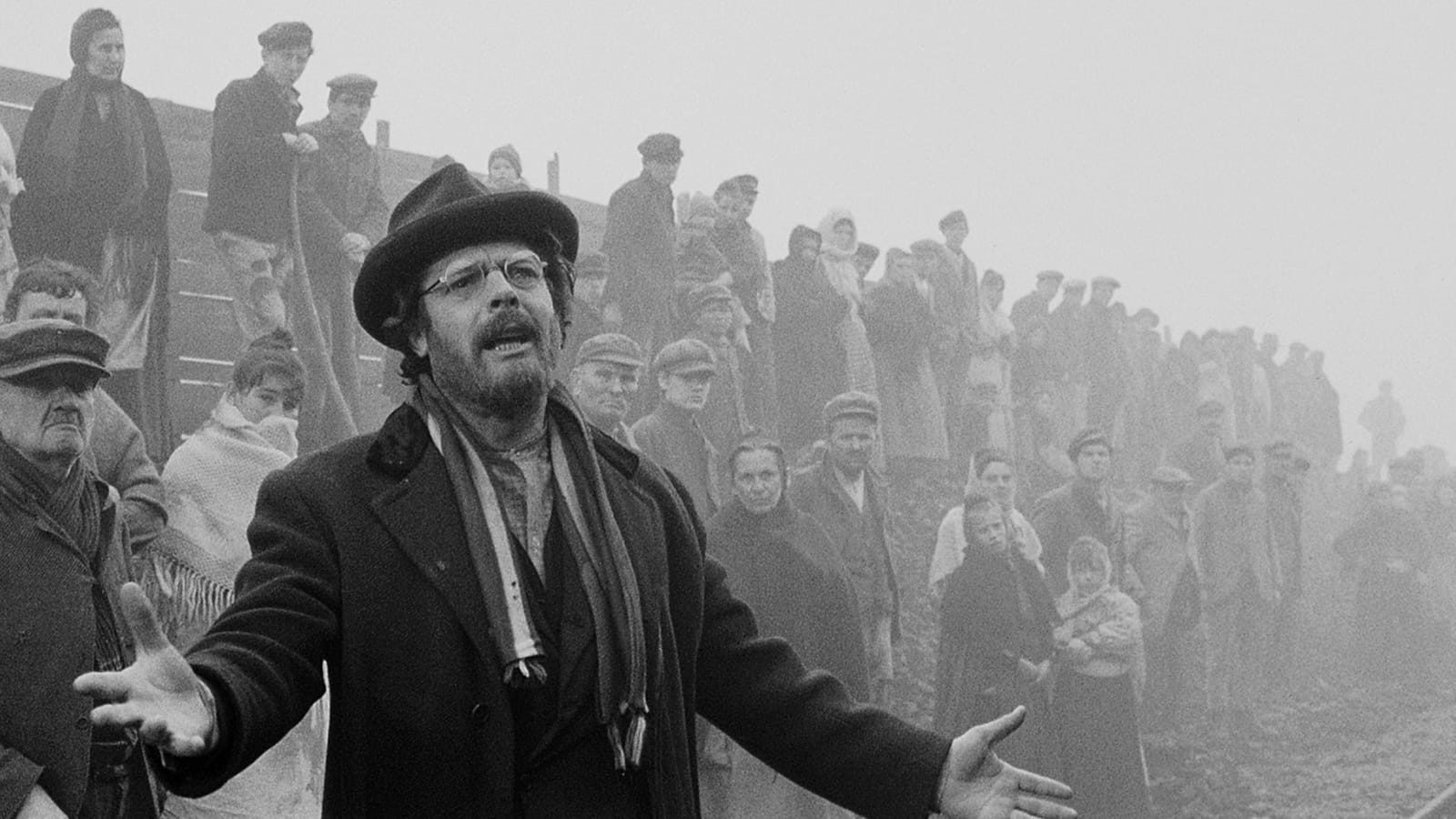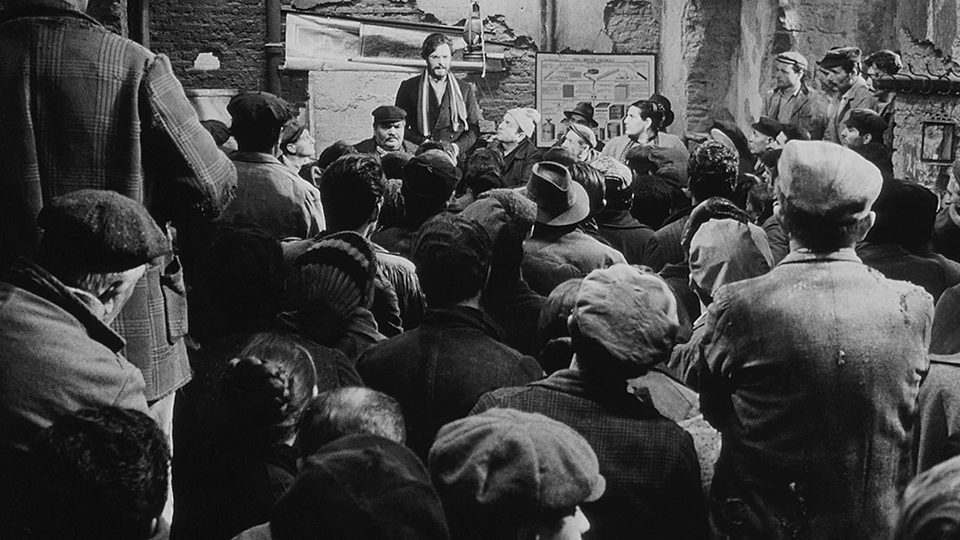
Review: The Organizer
Man is the only animal that has to work,” declares the Director of the Turin textile mill with feigned resignation, quoting an uncredited philosopher.
Standing at the tip of the Director’s desk, in ragged clothing insufficient to keep out the winter cold, are a group of millworkers who have formed a committee and, with the guidance of “the professor,” have commenced the bitter struggle for better working conditions. The theme of The Organizer (I compagni) is man’s attempt, once having accepted his fate as the only animal that has to work, to receive just compensation for that work, to be treated with respect by his employers, to live in dignity.
The film is set in Turin, at the close of the Nineteenth century. To this foggy, grey, rainswept city comes a vagabond high school professor. He brings, along with his tattered valise and pitifully few possessions, the discipline, imagination and intelligent direction needed to organize the workers’ first gropings toward a better life. Although their thirty-one day strike ends in failure and the death of two workers, a beachhead has been established from which later emerged the unionized and politically potent Northern Italian industrial worker.
Mario Monicelli’s direction is so totally unobtrusive that one might easily forget to give him the credit he deserves. His casting, even of the bit players, is perfect; his recreation of this period and place equals the sensitivity of Truffaut in Jules and Jim, and his staging of mob scenes (the fight between the strikers and scabs; the march on the factory) is immensely skillful.
Monicelli’s tense and forceful screenplay (written with Age Scarpelli and based on their original material) is filled with warmth, humor and irony. These are more than the standard working class cutouts with which a less committed director (Monicelli is a member of the Italian Socialist party) might have slopped together the usual this-is-how-it-was-before-the-workers-won-their-rights film. Monicelli brings these people to life because he presents them to us as individuals who eat, love, fight and blunder. One superb detail in Monicelli’s canvas is the scene between two young brothers from a working class family. Omero, older and already a factory worker, has come to pick up his brother at school. Learning from the teacher that the boy is not doing well, then listening to the younger boy complain “I don’t like it. I want to work in the factory like you!” Omero administers a severe beating to his brother. We feel, as Omero strikes each blow and shouts, “You’ll graduate. You’ll graduate! Before you do as I do, I’ll kill you!” that each slap is as painful to administer as to be received. The love and concern, the Old World sense of family—an older brother sacrificing himself so that his younger brother’s lot will be better than his own—that are conveyed in this short scene express a feeling that is captured with amazing accuracy, as anyone whose family includes a relative born in the “Old Country,” whatever that country might be, can tell you. The irony of the scene is apparent only at the conclusion of the film: Omero is killed by a stray bullet fired by the soldiers guarding the factory (a double irony because the soldier who may have fired the fatal bullet is in love with Omero’s sister); in the short succeeding scene, we find the surviving brother carrying Omero’s lunch pail as he starts his first day at the factory. Small touches like this—and there are many—bring alive these people, make us care about them, although they lived and fought their battles far away, in Northern Italy, almost eighty years ago.

The Organizer (Mario Monicelli, 1963)
The director has drawn a fine family portrait (although on a smaller scale) of the upper classes as well, the people who, for years, had totally controlled the destinies of the workers.
Marcello Mastroianni is superb as the professor, gentle and kind, yet a determined revolutionary making difficult practical decisions. In one virtuoso scene, Mastroianni (in a speech to workers who want to give up the strike) uses his voice, his breath—even the pauses between breaths—to build his argument slowly and masterfully, word by word, to persuade the workers to continue their strike. Of the professor, Monicelli has stated in an interview printed in the N.Y. Herald Tribune—“The professor corresponds more or less to the character of the Sheriff in the Western. He arrives and settles an injustice that victimizes a collectivity. He is one who redresses wrongs. I am saying this my way, of course, somewhat toned down with humor. The Professor does these things without giving them excessive importance. He is fun of astonishment, doubts, weakness and is somewhat ludicrous, but he is driven only by the desire to correct a situation. He is an intellectual, but one who sees clearly, at least for the moment. He understands that the strike is destined to fail, but he knows also that it has to be continued because it helps to mature the conscience of the workers. This is the moral weight of the plot.”
It is a tribute to the actors surrounding Mastroianni that, although his performance is so right in every detail, he does not overshadow their fine work: Folco Lulli’s performance (he received the Italian film industry’s award for best supporting actor) as the bullish Pautasso; Bernard Blier’s moderate and sensitive Martinetti; Renato Salvatori’s ostensibly hard and cynical Raul; and Elvira Tonelli’s stout and decent Cesarina, a woman reminiscent of those late nineteenth century portraits that hung in one’s grandparents’ living room. In addition, as in The Big Deal on Madonna Street, Monicelli gets an excellent tight-lipped performance from Antonio Casa Monica as “The Sicilian.”
Although the viewer has not been exposed in The Organizer to a new cinematic approach to reality, nor been asked new and startling questions, he nevertheless has seen a moment of the past re-created with such fidelity and warmth that it will remain with him long after he has stepped back into the neon-lighted night.








